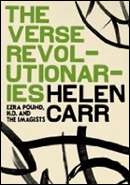 It is significant that Helen Carr opens her account of the Imagist movement with a personal detail: the moment in 1912 in the British Museum tea-room, when Ezra Pound read his one-time fiancée, Hilda Doolittle's completed poem, "Hermes of the ways", and, on the strength of it, pronounced her, "HD Imagiste". Whether or not this really marks the beginning of the Imagist movement, literary history hasn't been too concerned to investigate – the romance and drama of it have been enough.
It is significant that Helen Carr opens her account of the Imagist movement with a personal detail: the moment in 1912 in the British Museum tea-room, when Ezra Pound read his one-time fiancée, Hilda Doolittle's completed poem, "Hermes of the ways", and, on the strength of it, pronounced her, "HD Imagiste". Whether or not this really marks the beginning of the Imagist movement, literary history hasn't been too concerned to investigate – the romance and drama of it have been enough.
But this moment is significant for Carr's magnum opus (and at almost 900 pages, her study is just that), as it is an emphasis on the personal throughout that gives her work depth as well as breadth. Many of the now-forgotten figures of Imagism, such as Desmond FitzGerald and FS Flint, are resurrected here and given more than potted biographies: they are placed at the heart of an artistic theory that leant on Pater and Nietzsche, that was influenced by Maupassant and Stravinsky, and they are shown as real, living, breathing intellectuals.
Above them all, though, towers Pound: the dandyish poet who wore billiard-green trousers and blue capes, who carried a cane and sported an earring; the provincial American who found his home among London literary circles; the "ladies' man", of whom HD was to recall, "One would dance with him for what he might say" – though Pound was a terrible dancer. Carr's sympathy for Pound here, before the fascist ravings in Italy during the war and his subsequent incarceration in an American asylum, is clear from the outset, but she admirably refuses to take sides on many of the central quarrels and tragedies that emerge.
There are two crucial personal interactions during the birth of Imagism and they both involve Pound: his relationship with Margaret Craven, who was, unbeknown to many, his benefactor, and who killed herself, possibly when it became clear that he was involved with Dorothy Shakespear and would likely marry her (which he eventually did); and his battle with Amy Lowell, the wealthy American poet and patron who eventually wrestled the Imagism movement from his grasp, leaving him to turn to Wyndham Lewis and the Vorticists, in frustration and disappointment with those he had considered his friends.
Carr doesn't blame Pound for Craven's suicide, although without her financial support, it is possible that he would have had to return home and Imagism wouldn't have been born at all, so her investment in him is certainly significant enough to compound feelings of rejection. She is also fair to Lowell, often viewed as a figure of fun because of her size and manliness, who proved herself more than capable of carrying on the Imagist movement without Pound.
But, as with so many movements, there was a temporariness to Imagism, and Carr cites its three "stages", the final one being without Pound, doing an excellent job of convincing us of its importance and place in literary history, in spite of its brevity. It may well be that other players such as TE Hulme and Richard Aldington are no longer read, but their break from traditional poetic forms and embracing of French symbolism paved the way for modern poets such as TS Eliot and it's doubtful that the kind of contemporary poetry we have today would have happened without them.
Such large claims aside, it is the relationship between Pound and his fellow expatriate, HD, that controls the narrative flow of Carr's book. The dynamism between them was complex. Pound was a more assertive, bombastic presence who would score through HD's poems – as patriarchal an act as initialising and labelling her in the British Museum tearoom had been – but he was also sensitive and generous, offering to type up her poems for her. (In literary partnerships of the 20th century, it was nearly always the women typing up the words of their men.) HD, considered by many now to be an even greater poet than Pound, was not a clubbable woman but she needed her literary influences. Her appeal for Pound is clear here, as is his for her.
Some may find the personal overwhelmed here by the sheer weight of detail and huge cast of characters, and that's a risk Carr has taken by being as expansive as possible, wanting to give her Imagists the epic structure she feels they deserve. But I think she's pulled it off, being both particular and wide-ranging, and for me, this is the non-fiction book of the year. I don't see how it can be bettered.
The Verse Revolutionaries: Ezra Pound, H.D. and the Imagists
by Helen Carr
Jonathan Cape Ltd.
976 p, 2009
The Independent
14 June 2009